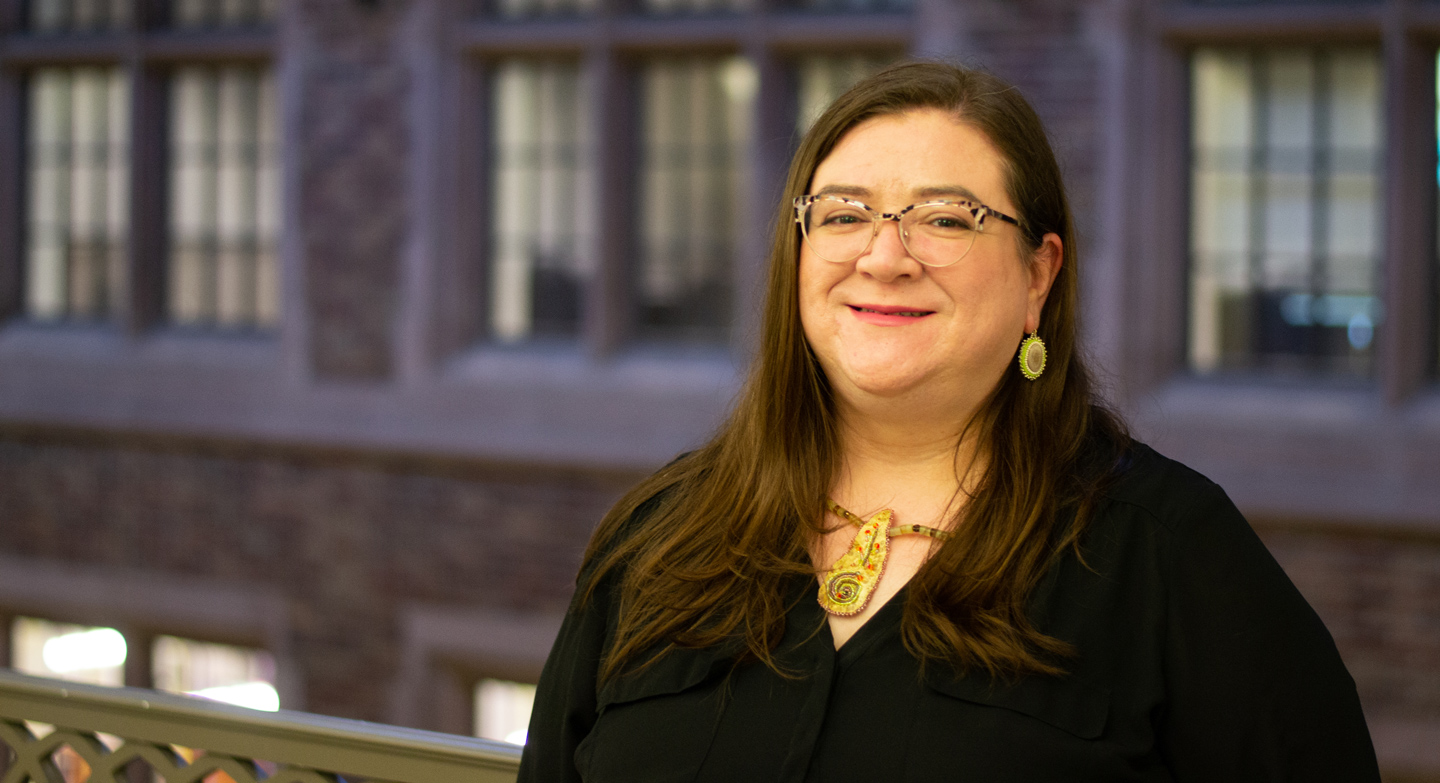To Lisa Dirks, community engagement is a key part of research
Lisa Dirks has taken an unusual path to her Ph.D. She came to the Information School as an accomplished researcher with a master’s in library and information science (MLIS) and master’s of health science administration. But she felt pursuing her doctorate would give her the strong theoretical foundation she needed to support American Indian and Alaska Native community engagement in the research process.
For the past 15 years, Dirks has conducted research in the area of health sciences, focusing on Indigenous communities. She received her MLIS from San Jose State University in 2013.
“I came in as more of a practice-based researcher; a lot of the work I had been doing was learned in the field and through supplemental training programs and on my own, but most of it has really focused on research techniques and actually practicing the research in an applied setting,” she said.
Dirks is the first recipient of the Alfonso Carlos Peña Graduate Fellowship, a new fellowship established by the Graduate Opportunities and Minority Achievement Program and the Office of Minority Affairs and Diversity. The fellowship seeks to support graduate students involved in research related to wǝɫǝbʔaltxʷ (Intellectual House).
For Dirks, who hails from the Unangan community of Atka in Alaska’s Aleutian Islands, work with Indigenous communities is deeply connected to her identity as an Alaska Native person. In conducting health sciences research, she became increasingly interested in how technology could facilitate community involvement, specifically for sharing research results with participants in communities like her own.
"Information that is collected in research doesn’t necessarily make it back to the community that participates in that research. I want to help change that."
“A lot of times, information that is collected in research doesn’t necessarily make it back to the community that participates in that research,” she explained. “I want to help change that.”
Dirks finds that research results are often communicated in highly academic language, making it inaccessible for many participants. She became especially concerned after learning about a mitochondrial DNA study conducted by university researchers who shared their results with participating Unangan communities. The researchers simply submitted excerpts from their academic article to a regional newsletter without offering definitions for technical terms or providing insight into how the research helps their communities, which made it difficult for participants to understand the significance of the study’s findings. Most troubling of all, Dirks found, was that the researchers referred to the community members as “haplogroups” rather than people.
“My questions for the researchers were, ‘Who did you consult with?’” Dirks said. “’Did you not think it might have been inappropriate to refer to people in the way you did?’ And lastly, ‘How are you going to collaborate with community participants in the future when communicating results back so that they have more impact?’”
Dirks’ work reviewing research processes in tribal health organizations, specifically through focus groups and interviews with community members, has suggested that one potential alternative to sharing results in newsletters could be to do so through open dialogue.
“Instead of being a one-directional dissemination, they want more conversations around results,” she explained.
At the iSchool, where she is advised by Professor Wanda Pratt, Dirks has developed a strong academic foundation for addressing information issues in practice.
“A lot of what I have gained so far in the program is a theoretical grounding in areas that I didn’t necessarily fully understand, and I’ve discovered how different theoretical approaches relate to my world view,” Dirks said.
Miranda Belarde-Lewis, a member of Dirks’ Ph.D. committee and an assistant professor of North American Indigenous Knowledge at the iSchool, believes that Dirks’ expertise as a practice-based researcher enhances her approach to understanding information problems.
“Her first-hand knowledge helps shape her research questions as she explores and deepens her understanding of Indigenous perceptions, creation and uses of health data sets, as well as the application of health informatics, human-computer interaction and value sensitive design methods,” said Belarde-Lewis. “I'm very excited to see how Lisa's research is shaped by her education here at the iSchool and I'm even more excited to see how Lisa shapes the field of Indigenous health informatics in service of Alaska Native, Native American and Indigenous peoples.”
Dirks is exploring how her work fits with postcolonial and feminist theories.
“I like to think of using methods that are most appropriate for the given situation,” she said. “At the same time, I also lean toward action-oriented research — so research that is actually helping to make some change and create action around an area. It is my hope my research will be made useful to community participants and implemented in some meaningful way.”
